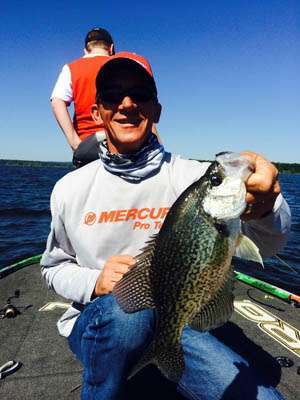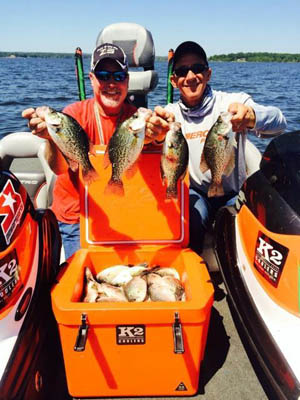
Catch up on part 1 here.
In between all of this, Tommy Biffle was offering to help. And, while he was making his offers he was also telling me gruesome tales of fishing injuries he had seen over the years. I’m guessing they were supposed to make me feel better. You know, mine wasn’t all that bad in the grand scheme of things.
What they really did was terrify me. I finally told him to stop. He did but only after repeating the worst one for the second or third time. (I tell this part of the story in good spirit. Tommy is a really fine fellow and a credit to professional bass fishing.)
Once my fish were weighed, I headed to the emergency room. On the way I was stopped for speeding. Once the officer saw my head, the hooks and all the blood he let me off with a warning. He even helped me by calling ahead so that the emergency room was ready for me. Nice guy.
At this point I want to say something about the emergency medical facilities in Many, Louisiana. As a serious skateboarder and lifelong angler I’ve seen my share of emergency rooms. For the most part they’re horrible. Some are so bad they make you consider dying instead of waiting for treatment.
That is not the case in Many. The physical facilities are good. The staff was professional. In short, they set a standard that most of the other ones I’ve been to should aspire. I really can’t say enough good about them. If you decide to hook yourself in the ear and head, I suggest you do it in Many, Louisiana.
The experience of them removing the hook was pretty bad, though. They gave me a couple of shots of some kind of local anesthetic. I couldn’t feel a thing, but I sure could hear. I can still close my eyes and listen to the hook cutting through cartilage and bone as they removed it. (I’m drawing up in the fetal position just writing about it.)
There were two positive things — besides the emergency room — that I want to mention about the whole experience:
First, I had as much help as I could have ever wished for during my fateful trip. The fireman, my Marshal, my fellow anglers, the policeman and everyone else helped as best they could. I’m appreciative of that.
Second, neither Dennis Tietje nor I made the cut. That’s not really a positive thing but it did have a positive ending. Dennis is a super crappie angler and guide. He took me crappie fishing. The man knows what he’s doing. He has a technique that is both simple and brilliant. I don’t feel comfortable talking about what another angler does so please forgive me for not giving you any of the details. Anyway, we caught our limits in less than three hours. They were big ones, too.
Dennis is a super crappie angler and guide. He took me crappie fishing. The man knows what he’s doing. He has a technique that is both simple and brilliant. I don’t feel comfortable talking about what another angler does so please forgive me for not giving you any of the details. Anyway, we caught our limits in less than three hours. They were big ones, too.
There’s a play written by William Shakespeare titled All’s Well That Ends Well. Both the play and my week at Toledo Bend are (were) complicated and full of challenges. But, if things work out in the end, what do we really have to complain about? Shakespeare had it right.

